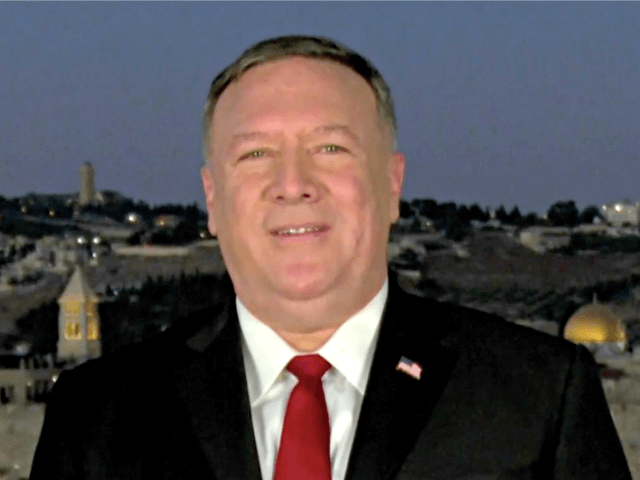Secretary of State Michael Pompeo on Wednesday announced the United States will place restrictions on Chinese diplomats in the U.S. in a move reciprocal to those placed on American diplomats on China.
Those new restrictions include U.S. approval for senior Chinese diplomats’ visits to university campuses and meeting with local government officials. The U.S. will also have to approve cultural events with groups larger than 50 people hosted by the Chinese government outside of its embassy and consular post.
In addition, the U.S. is taking “further steps” to ensure all official People’s Republic of china (PRC) embassy and consular officials’ social media accounts are clearly labeled as chinese government accounts.
Pompeo said:
For years, the Chinese Communist Party has imposed significant barriers on American diplomats working inside the PRC. Specifically the Chinese Communist Party has implemented a system of opaque approval process is designed to prevent American diplomats from conducting regular business, attending events, securing meetings, and connecting with the Chinese people especially on university campuses and via the press and social media.
We are simply demanding reciprocity. Access for our diplomats in China should be reflective of the access that Chinese diplomats in the United States have and today’s steps will move us substantially in that direction,” Pompeo said at a briefing at the State Department.
Pompeo also said Under Secretary for Economic Growth, Energy, and the Environment Keith Krach recently sent a letter to the governing boards of American Universities alerting them to the threat the Chinese Communist Party poses to academic freedom, human rights, and university endowments.
He said university governing boards can help by disclosing all PRC companies’ investments in university endowment funds and divesting from Chinese companies that are contributing to human rights violations, military coercion, and other abuses.
He also said they can help by “simply understanding” the recommendations issued by the president’s working group on financial markets, which examine the risk to investors of Chinese companies listed on U.S. stock exchanges.
Pompeo highlighted China’s military “bullying” along its border with India, in the Taiwan Strait, the South China Sea, and other areas.
“From the Taiwan Strait to the Himalayas and beyond, the Chinese Communist Party is engaged in a clear and intensive intensifying pattern of bullying its neighbors,” he said.
He highlighted that the U.S. last week imposed sanctions and visa restrictions on Chinese individuals and entities responsible for the CCP’s “imperialism” in the South China Sea, that include unlawful energy surveillance activities in the economic zones of the Philippines and other allies.
“We also remain concerned … on the activities of more than 300 Chinese flag vessels near the Galapagos which are almost certainly engaged in illegal fishing,” he said.
“China is the most flagrant violator of the Law of the Sea convention and nations all across the world are registering their disapproval,” he said.
Pompeo also addressed CCP General Secretary and Chinese President Xi Jinping’s recent call to increase its control over Tibet.
“We continue to call upon Beijing to enter into dialogue with the Dalai Lama or his representatives without preconditions to reach a settlement that [resolves] their differences,” he said.
Pompeo said he plans to see his counterparts next week at a host of virtual Association of Southeast Asian Nations meetings on the coronavirus, North Korea, South China Sea, Hong Kong, and Burma.
Follow Breitbart News’s Kristina Wong on Twitter or on Facebook.

COMMENTS
Please let us know if you're having issues with commenting.